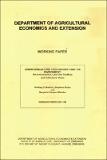| dc.contributor.author | Mudimu, Godfrey D. | |
| dc.contributor.author | Siziba, Shepherd | |
| dc.contributor.author | Hanyani-Mlambo, Benjamin | |
| dc.coverage.spatial | Zimbabwe. | en |
| dc.date.accessioned | 2015-09-11T13:35:37Z | |
| dc.date.available | 2015-09-11T13:35:37Z | |
| dc.date.issued | 1998 | |
| dc.identifier.citation | Mudimu, G., Siziba, S. and Hanyani-Mlambo, B. (1998) Urban Agriculture, Food Security and the Environment: Socio-economics, Land Use Conflicts and Cultivators’ Views. DAEE Working Paper no. 1/98. UZ, Mt. Pleasant, Harare: DAEE. | en |
| dc.identifier.uri | https://opendocs.ids.ac.uk/opendocs/handle/20.500.12413/6951 | |
| dc.description | A DAEE working paper on urban agricultural activities in Zimbabwe. | en |
| dc.description.abstract | Crop production on open municipal and undeveloped lands has become a significant source of the food security and indirectly sources of household cash income generation or savings. Advent of economic reforms has exacerbated urban agriculture. This is because of the removal of subsidies on food commodities and retrenchments in the formal employment sectors. These have in turn contributed to falling real incomes and reduced food security status of urban households. Urban cultivation had become an important strategy through which families cope with the impact of the economic structure adjustment programme. Though a widespread practice, urban agriculture is not planned for or supported by other planners and managers as a legitimate form of urban land use. Urban agriculture comes into direct conflict with planning provisions for urban space. This study examines the socio-economics of urban crop on municipal lands, cultivators’ views and perceptions on the use of urban space for agricultural activities and related issues in Harare, Zimbabwe. Urban agriculture is used for subsistence maize production. It improves food grain availability, thus increasing household food security and real incomes available for other household requirements as contributes to savings on food expenditure. This is the incentive for cultivation on undeveloped urban land spaces. The study gives empirical insight on the uses of urban space for agricultural activities from the cultivators' perspectives. The findings of the study also show that there is a serious problem of lack of concern for the environment on the part of the cultivators. The majority of the cultivators were aware of but ignored the steam bank regulations. There was general lack of knowledge about the environmental effects of cultivation on the urban environment. Given the importance of urban agriculture to the cultivators and the concern on the environmental impacts, there is need to design extension programmes through which the cultivators would be provided with advice on proper land use husbandry. | en |
| dc.language.iso | en | en |
| dc.publisher | Department Of Agricultural Economics and Extension (DAEE) (University of Zimbabwe) (UZ) | en |
| dc.relation.ispartofseries | Agricultural Economics & Extention;AEE 1/98. | |
| dc.rights.uri | http://creativecommons.org/licenses/by-nc-nd/3.0/ | en |
| dc.subject | Agriculture | en |
| dc.subject | Economic Development | en |
| dc.subject | Environment | en |
| dc.title | Urban Agriculture, Food Security and the Environment: Socio-economics, Land Use Conflicts and Cultivators’ Views | en |
| dc.type | IDS Working Paper | en |
| dc.type | Series paper (non-IDS) | en |
| dc.rights.holder | University of Zimbabwe (UZ) | en |


